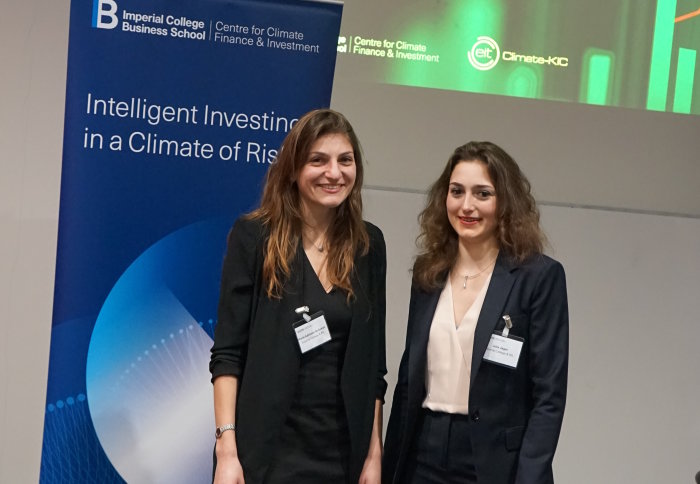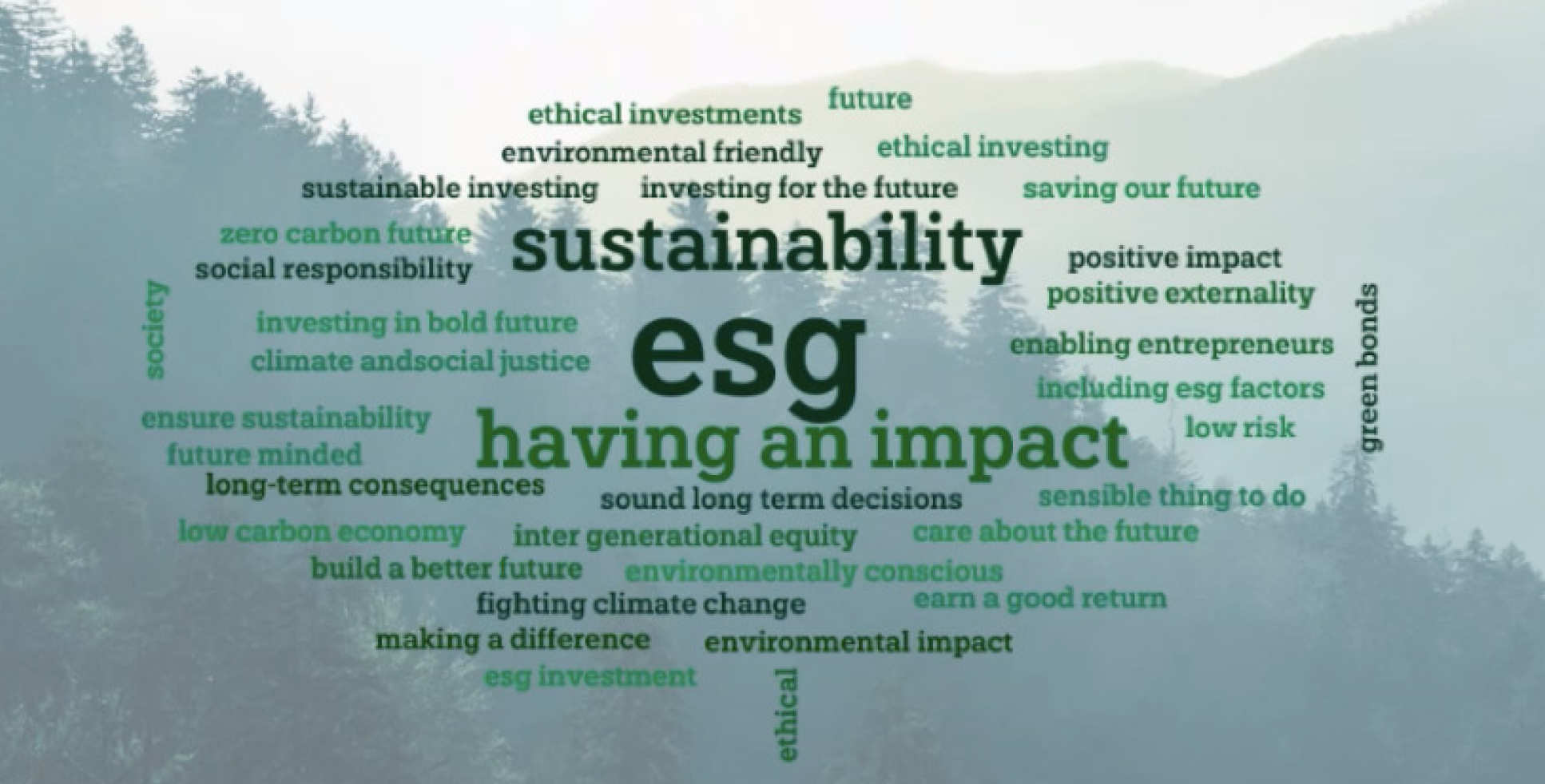Q&A: What does responsible investment mean for my pension?
by Simon Levey

Organisers Marie-Adélaïde Bullukian and Julia Jager
Simon Levey interviews Marie-Adélaïde Bullukian about responsible investment, strategies for engaging your pension provider, and what to do next?
Following a panel discussion hosted by the Grantham Institute, Imperial’s Centre for Climate Finance and Investment, and the student-led club Responsible Investment Imperial, Simon Levey, Grantham Institute Communications Manager, talks to organiser Marie-Adélaïde Bullukian, a student on the MSc Climate Change, Management and Finance programme at the Business School, about responsible investment, strategies for engaging your pension provider and how far can you ensure your pension investments are put to a good use.
Independent providers and major employers, including universities, manage pension plans and endowments on behalf of staff, and therefore could have an important role to play in supporting responsible investment. While individual investors rarely have much influence on their own, we discovered that together there are other ways to use their voice on issues they care about.
Why should we care about responsible investment?
Responsible Investment is an approach that anybody can take. Put simply, it means weighing up environmental, social and governance (ESG) factors and taking them into consideration when investing your money. Examples of ESG factors include a company's impact on climate change or carbon emissions, water use or conservation efforts, and employee relations and diversity, amongst others.
Does responsible investment have an impact on the size of pensions?
Investing responsibly is commonly thought to negatively impact returns, but this is far from being universal. The reality is much more complex. ESG factors have different effects on different asset classes (e.g. equities, stocks or bonds) and sectors of the economy where you might choose to invest, so there is no real one-size-fits-all answer.
So what is the financial case for responsible investment?
At our event, Patrick Bolton, Professor of Business of Climate Change at Columbia Business School, presented his latest research, Hedging Against Climate Risk, co-authored with Anderson and Frédéric Samama. He explained that by taking into consideration carbon risks and not investing in firms with high carbon footprints, you outperform the market. Why is that? “More and more investors are becoming aware of climate change and its impacts, and this is reflected in the markets” he says.
How can I tell if my pension is invested responsibly?
Imperial staff can subscribe to one of three pensions, Superannuation Scheme of University of London (SAUL), NHS Business Service Authority (NHSBA) pension, and the University Superannuation Scheme (USS), which is one of the largest in the UK for academics. USS has a team of six people working on ESG factors and a Responsible & Ethical Investment policy. However, this is an exception rather than the rule. “USS and Church of England Pensions Board are two of the best equipped, in fact most pensions funds simply do not have the resources to do much,” said David Russell, Head of Responsible Investment at USS. an international platform for stewardship, and now represents investors handling USD 80 trillion. Membership of PRI requires investors to adhere to the six principles outlined below.
- We will incorporate ESG issues into investment analysis and decision-making processes
- We will be active owners and incorporate ESG issues into our ownership policies and practices
- We will seek appropriate disclosure on ESG issues by the entities in which we invest
- We will promote acceptance and implementation of the Principles within the investment industry
- We will work together to enhance our effectiveness in implementing the Principles
- We will each report on our activities and progress towards implementing the Principles
What is the debate around divest versus engage?
It is common to confuse Responsible Investment with Ethical Investment – but these are actually different. For example, USS's Responsible Investment strategy calls for engagement with certain companies while their Ethical Investment route would simply divest from certain firms.
The divest versus engage debate is contentious in the field. Professor Bolton explained that on one hand you could try to "starve the carbon sector financially" by divesting from these companies, and on the other, you could engage with them and 'call for action'. He says: "The debate has now shifted towards some combination of the two" as, under pressure, fossil fuel industries are starting to adopt climate targets.
How can I make an impact with my pension?
According to Adam Matthews, Director of Ethics and Engagement at the Church of England Pensions Board, "pensions funds are at the forefront of the energy transition, with the ability to shape the market and influence the global policy debates". In fact, the Climate Action 100+ initiative of investors, which includes the Church of England, recently convinced mining giant Glencore to cap its coal production and align itself with the goals of the Paris Agreement on climate change. And, you can make a meaningful change to your own pension fund.
So what can I do?
- Find out if your pension subscribes to the UN Principles for Responsible Investment https://www.unpri.org/signatories/signatory-directory
- Write to your pension provider, directed to the Head of Corporate Affairs or Trustees, to raise your concerns about responsible investment. If you are Imperial Staff you can contact the College Pensions team at pensions@imperial.ac.uk
- Attend an Annual General Meeting (AGM) to voice your concerns. Charities like ShareAction can help you do this
- University staff with a USS pension over 55k, you can actually switch to an "Ethical Lifestyle" option for any top-up money you pay into your pension, as explained by Dr Neil Jennings on the Grantham Institute blog.
What's next for people who want more responsible investment?
 Interest in sustainable finance is growing. Just take a look at the increasing number of networks dedicated to this topic, such as Positive Investment, which is made of academics and students at the Universities of Cambridge, Oxford, Imperial and UCL, and Impact Investing societies at Imperial, Kings and LSE.
Interest in sustainable finance is growing. Just take a look at the increasing number of networks dedicated to this topic, such as Positive Investment, which is made of academics and students at the Universities of Cambridge, Oxford, Imperial and UCL, and Impact Investing societies at Imperial, Kings and LSE.
For more evidence, get in touch with Imperial's Centre for Climate Finance and Investment, led by Dr Charles Donovan, which offers a free online course: Climate Change: Financial Risks and Opportunities.
The Grantham Institute and Imperial College Business School also offer an MSc in Climate Change, Management and Finance, led by the award-winning Dr Mirabelle Muûls.
If you are a student wanting to learn about this topic, Responsible Investment Imperial will be organising a student-led conference on sustainable finance and impact investing on Saturday 11 May 2019. Check back for further details soon.
The event featured a keynote address by Patrick Bolton, Professor of Business of Climate Change at Columbia Business School, followed by a panel discussion with Adam Matthews Director of Ethics and Engagement at CEPB, David Russell Head of Responsible Investment at USS, Anastasia Guha Director of Northern Europe and MEA at PRI, chaired by Dr Charles Donovan, Director of Imperial’s Centre for Climate Finance and Investment.
For the latest news, views and events from the Grantham Institute, sign up to our weekly update newsletter.
Article text (excluding photos or graphics) © Imperial College London.
Photos and graphics subject to third party copyright used with permission or © Imperial College London.
Reporter
Simon Levey
Communications Division